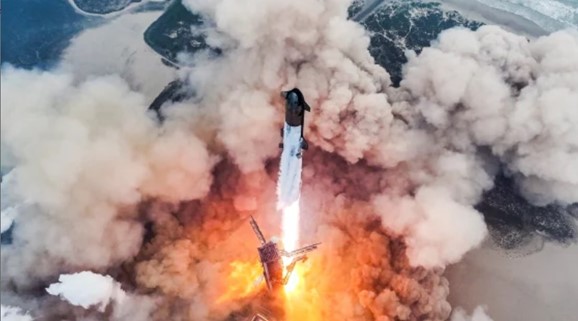
SpaceX Violated Environmental Regulations in Texas, Polluting Local Waters
SpaceX, the aerospace company led by Elon Musk, has been found to have repeatedly violated environmental regulations in Texas by releasing pollutants into or near water bodies, according to a notice from a state environmental agency. The Texas Commission on Environmental Quality (TCEQ) stated that SpaceX's water deluge system at its Starbase launch site was the source of these violations.
The TCEQ's notice, issued last week, came five months after the Environmental Protection Agency (EPA) Region 6 office, which oversees Texas and surrounding states, informed SpaceX that it had breached the Clean Water Act due to similar activities. These notices and the related investigations, which were obtained by CNBC, had not been previously disclosed.
On August 6, 2023, the TCEQ office in Harlingen, Texas, near the Boca Chica Starbase, received a complaint accusing SpaceX of "discharging deluge water without TCEQ authorization." In total, 14 complaints were filed regarding environmental impacts from SpaceX's deluge system, according to the regulator's report.
Compliance with both state and federal environmental laws is generally required for aerospace companies, including SpaceX, to receive approval from the Federal Aviation Administration (FAA) for future launches. SpaceX is currently seeking permission to conduct up to 25 launches and landings of its Starship spacecraft and Super Heavy rocket annually at its Boca Chica facility. However, these violations may delay those approvals and could result in civil penalties, further investigations, and even criminal charges.
Despite these notices, SpaceX stated in a lengthy post on X (formerly Twitter) that regulators have allowed them to continue with their launch operations. The company asserted that it had been informed that the operations could proceed despite the violation notices. However, neither the TCEQ nor the EPA responded to CNBC's inquiries regarding SpaceX's statement.
Rush to Rebuild Amid Environmental Concerns
On July 25, 2024, a TCEQ environmental investigator conducted a compliance review and found that SpaceX had discharged industrial wastewater without a permit on four occasions between March and July of this year. The water deluge systems, designed to manage the heat, sound, and energy from orbital test flights and rocket launches, had not been integrated into the Boca Chica site before the test flights of SpaceX's largest rocket, Starship.
SpaceX is developing the Starship to transport people and equipment to the moon and potentially to Mars. However, the first test flight in April 2023 resulted in the explosion of SpaceX's concrete launchpad, with debris damaging a nearby nesting and migration site for endangered species, and a fire spreading across Boca Chica State Park Land. Environmental groups have since filed lawsuits against SpaceX and the FAA, which had approved the launches.
As Musk pushes for another orbital test flight within months, SpaceX has rushed to rebuild the launchpad, including installing a new water deluge system. The company reportedly bypassed the permitting process that would have required it to meet pollutant discharge limits and outline its wastewater treatment plans.
SpaceX conducted the first full-pressure test of this system in July 2023, leading to an EPA probe into its wastewater discharges. Despite receiving an EPA violation notice on March 13, SpaceX proceeded with its third Starship test flight the next day, using the unauthorized water deluge system.
Environmental engineer Eric Roesch, who predicted the need for such a system at the launchpad, warned that continuing operations without proper permits increases SpaceX's legal risks. Additional wastewater discharges could lead to more investigations and potential criminal charges, Roesch stated.
Concerns Over Longstanding Violations and Mercury Levels
SpaceX failed to apply for a necessary permit within 30 days of receiving the EPA notice, only submitting its application 110 days later. Roesch pointed out that SpaceX has a history of violating wastewater regulations, seemingly with the FAA's approval.
Kenneth Teague, a coastal ecologist, reviewed SpaceX's 483-page permit application and criticized it for missing key details such as water discharge volumes, effluent temperatures, and outfall locations. Teague expressed concern about the mercury levels in SpaceX's wastewater, which significantly exceed state water quality criteria and could harm local wildlife.
SpaceX, however, claimed in a statement that no detectable mercury levels were found in its samples, although its application reported mercury concentrations well above the permissible limits. The company's permit application remains under scrutiny as the FAA postponed public meetings related to SpaceX's plan to increase launches at Boca Chica. New dates for these meetings have yet to be announced.